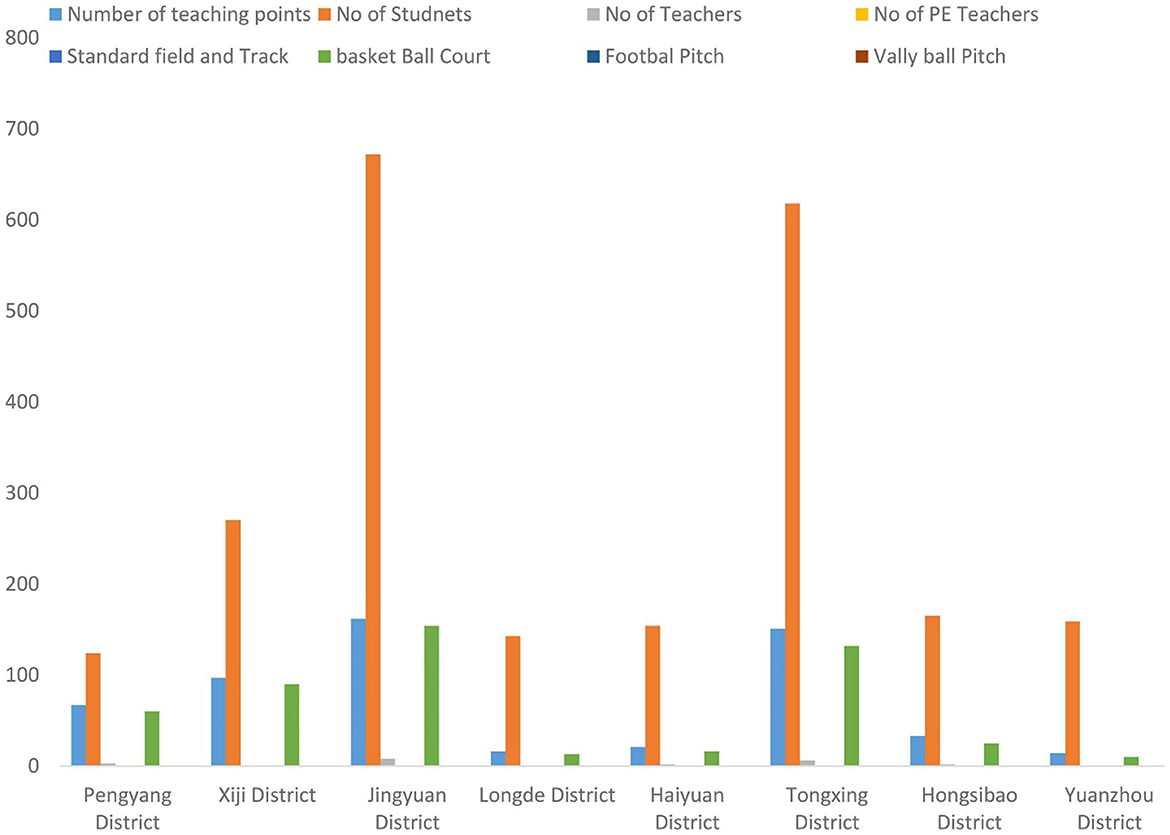Dilemma and countermeasure of sustainable leadership in physical education development in southern rural Ningxia, China
- 1College of Physical Education and Health, East China Normal University, Shanghai, China
- 2College of Physical Education, Ningxia Normal University, Guyuan, Ningxia, China
A corrigendum on
Dilemma and countermeasure of sustainable leadership in physical education development in southern rural Ningxia, China
by Fu, X., and Zhu, W. (2022). Front. Psychol. 13:947694. doi: 10.3389/fpsyg.2022.947694
In the published article, there were errors in the affiliations of Xiaoya Fu and Weiqiang Zhu as published. Instead of “Xiaoya Fu1 and Weiqiang Zhu2*”, it should be “Xiaoya Fu1,2 and Weiqiang Zhu1*”.
In addition there was an error in affiliation 2 as published. Affiliation 2 was listed as: “Department of Education, Ningxia Normal University, Guyuan, China” but should be “College of Physical Education, Ningxia Normal University, Guyuan, Ningxia, China”.
In the published article, there was also an error in the caption of Figure 1 as published. “Status of non-availability of PE facilities (Li et al., 2018)” should have been “Status of non-availability of PE facilities (Source: Author's pilot data)”. The revised Figure 1 caption Figure 1 appears below.
In the published article, there was also an error in Literature review, “Research design”, Paragraph 1. In the second sentence the study location was given as “in the Sothern area of China” but should be “in the mountainous and rural areas of Southern NingXia”. The revised paragraph is included below.
“Based on the objectives of the study, the multi-stage mixed method was applied to explore and comprehend the underlying phenomena in detail. In the first stage as shown in Table 1, content analysis was done besides contextual analysis to get the ground information of the PE in the mountainous and rural areas of Southern NingXia. In the second phase, a pilot study was conducted to explore the underlying state of PE. Based on the pilot study results, a qualitative open-ended interview was conducted with the education experts to further clarify the stances raised in the pilot phase of the study; during the interview, the objective of the interview was explained verbally and consent was scored. In the final stage, from the reliability and generalizability standpoint, a quantitative, cross-sectional large-scale study was conducted. Data were collected from the two-state of southern areas of Southern Ningxia in China using the 5-Likert scale and adopted questionnaire added in Supplementary Appendix. Moreover, to make the result more cohesive, specific, and reliable, the target population was divided into two strata, i.e., Faculty (Teachers) and Students, to get both perspectives individually and clearly. Furthermore, a convenient sampling technique was applied in the third phase of the data collection, and the reason for it was that those qualify the requirement, i.e., enrolled in school as a student and teacher, were eligible for inclusion in the study”.
In addition, in Literature review, “Qualitative interview thematic analysis”, Paragraph 1. The study location was given as “in the Hubei city of Ningxia Province” but should be “in the mountainous and rural areas of Southern NingXia”. The corrected paragraph appears below:
“In the first phase, a qualitative study was conducted as per the need and requirements of the study design. The study was conducted in February 2019 in the mountainous and rural areas of Southern NingXia. An open-ended structure questionnaire was designed on the results of the pilot study and a total of 10 experts participated in the interview, among them six were men and four were women, having bachelor's degrees with professional (education) related experiences. The main question asked was “Do you consider that psychical education is declining in the remote areas of China?,” followed by several contextual supportive mini questions and explanations, to clarify the content clearer for understanding. The thematic analysis of the open-ended interview is given here”.
The authors apologize for these errors and state that this does not change the scientific conclusions of the article in any way. The original article has been updated.
Publisher's note
All claims expressed in this article are solely those of the authors and do not necessarily represent those of their affiliated organizations, or those of the publisher, the editors and the reviewers. Any product that may be evaluated in this article, or claim that may be made by its manufacturer, is not guaranteed or endorsed by the publisher.
Keywords: sustainable leadership, sustainable strategies, sporting leadership, technological support, physical education
Citation: Fu X and Zhu W (2023) Corrigendum: Dilemma and countermeasure of sustainable leadership in physical education development in southern rural Ningxia, China. Front. Psychol. 14:1172040. doi: 10.3389/fpsyg.2023.1172040
Received: 23 February 2023; Accepted: 28 March 2023;
Published: 12 May 2023.
Approved by:
Frontiers Editorial Office, Frontiers Media SA, SwitzerlandCopyright © 2023 Fu and Zhu. This is an open-access article distributed under the terms of the Creative Commons Attribution License (CC BY). The use, distribution or reproduction in other forums is permitted, provided the original author(s) and the copyright owner(s) are credited and that the original publication in this journal is cited, in accordance with accepted academic practice. No use, distribution or reproduction is permitted which does not comply with these terms.
*Correspondence: Weiqiang Zhu, endwZTE2M25vcm1hbCYjeDAwMDQwO2dtYWlsLmNvbQ==; endxMDUyNSYjeDAwMDQwOzE2My5jb20=
 Xiaoya Fu1,2
Xiaoya Fu1,2 Weiqiang Zhu
Weiqiang Zhu